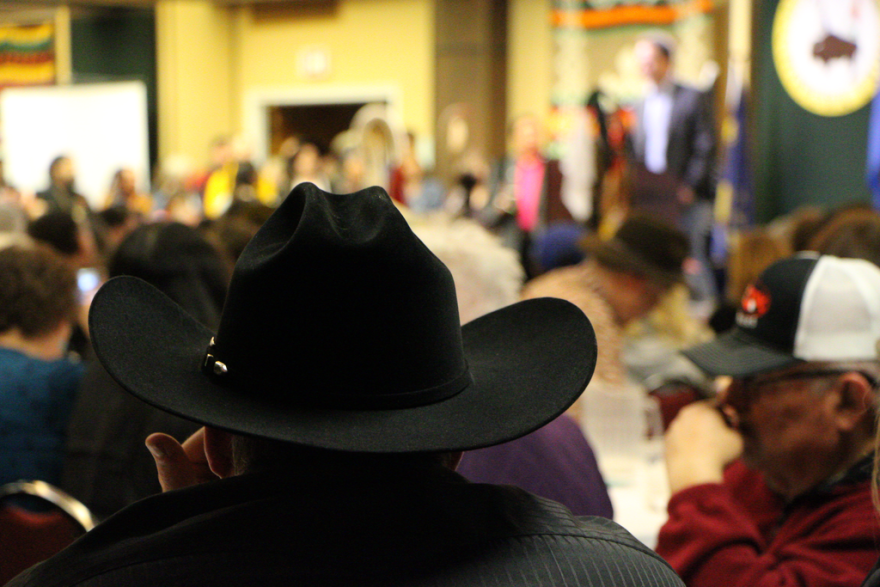This weekend, the Little Shell Tribe of Chippewa Indians celebrated something generations have fought for and that 400 other U.S. tribes are without: federal recognition.
It means the federal government now recognizes the tribe as a sovereign nation.
Hundreds, maybe thousands of people are crammed into a narrow hallway, waiting to be seated for a celebratory dinner at a Great Falls convention center. People are embracing, talking to their neighbors in line.
Little girls in pow wow dresses are stomping on the carpet floor, warming up for the dance later that night.
Caterers with stacks of dishes in their hands try are trying to clear a path through the crowd.
Inside, Little Shell Tribal Chairman Gerald Gray stands at a podium in the center of a crowded room.
Men take their cowboy hats off and placed them over their hearts. Babies bounce on their mother’s laps, none of them crying. Every other person holds up their smartphone to videotape his speech.

“Tonight we commemorate an event that no tribe should ever have to go through,” Gray said.
The Little Shell first pushed for federal recognition during treaty talks over a hundred years ago. Without it, the tribe wasn’t recognized as a sovereign nation or eligible for federal dollars.
Now the tribe is guaranteed a land base within these Montana counties—Blaine, Cascade, Glacier and Hill—and federal resources from agencies like the Bureaus of Indian Affairs and Indian Education. That’s after the tribe gained federal recognition through the national defense bill last month.
“We also now have to think of our future generations and build a strong nation for them,” Gray said to a packed house.
“A nation that provides jobs, education, elder and veteran services. A nation that is healthy and economically self-sufficient.”
Gray told Yellowstone Public Radio that the Indian Health Service has agreed to provide healthcare for tribal members at existing facilities once the tribe provides its enrollment files.
“It’s number one. We need to provide access to healthcare for our members.”
He said it's his priority for the tribe’s fifty-five-hundred members.
Josh Clause is an attorney for the tribe and said he’ll work with Gray to help get the tribe federal benefits over the coming months.
He’s represented tribal nations for over a decade but said this is the only time he’s worked with a tribe that’s become federally recognized.
“It’s incredibly rare,” he said. “Two Congresses ago, six tribes in Virginia received federal recognition through an act of Congress but prior to that it’d been 2001.”
Clause said when he first started lobbying for Little Shell federal recognition, his peers on Capitol Hill thought it was a lost cause.
Downstairs, fiddle music is bumping. The tribe is known for their jig dancing. Sisters Randi and Julie Paynter are sitting down at a dinner table, digesting the speeches they just heard from politicians like Montana Governor Steve Bullock and tribal leaders from around the state. Randi, who flew in from Northern California, said this day is about validation.
“This isn’t about casinos,” she said. “Great Falls doesn’t need another casino. This isn’t about what we’re going to get. The entire thing is about identity. It’s so valuable. And I wouldn’t have missed it for the world.”
Her sister Julie, who flew in from Salt Lake City, chimes in.
“I’ve often thought about this, in my identity being Native or mixed-race background and not really having that card or the official label to say, ‘oh this is part of who you are as a person.’”
She said that’s made it hard to feel like she belongs, like she’s a true Native American. But not tonight.
Randi said she sees family when she looks around. Literally. She said they all look related.
“There was a lady that came up to me and said, ‘Lisa, Lisa.’ And I said, ‘Oh, I’m sorry, I’m not Lisa.’ And she said, ‘Oh, you look just like her from the side.’”
The Little Shell lost their ancestral homelands in North Dakota in 1892, when Chief Little Shell rejected a low offer for his tribe’s land. According to documents submitted to the Bureau of Indian Affairs, the government removed tribal members from their lands and enrollment lists. Descendents later clustered in communities on the outskirts of Great Falls, Helena and along the Hi-Line.
Family is on the Paynters’ minds tonight. The sisters said the tribe is poised to receive things that would’ve meant a lot to their deceased family members.
“The most powerful things, and it’s somewhat bittersweet, is that the access to healthcare could’ve been life changing for my grandparents, who all suffered from diabetes and there were some inter-generational issues that came up from that Native identity.”
The sisters said they had to leave Montana to find things like healthcare, jobs, and college educations. They said if the tribe had been federally recognized, there’s a good chance the resources would’ve allowed them to stay.
Olivia Reingold is Yellowstone Public Radio’s Report for America corps member.





